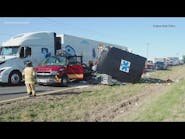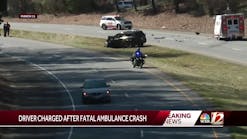Va. Firefighters Seek Mental Health Help After 'Bad Call'
Source Richmond Times-Dispatch, Va.
Sept. 11--It took a "bad call" -- when a 13-year-old on a bicycle was fatally struck by a car on a winding road in Sandston -- for Henrico County firefighter and EMT Troy Cummings to realize the importance of mental health services available to fire department personnel.
Cummings and several other first responders on the scene had children about that age. Amid the rush of emotions, it took him 20 minutes longer than usual to fill out the report at the hospital.
When the unit returned to the station, licensed clinical social worker Steve Bard was waiting for their debriefing. Anytime there's a death involving children on a Henrico Division of Fire call, a mental health liaison or chaplain becomes the "911 for 911," chaplain Mike Woods said.
"Initially, you don't have any emotions," Cummings said of responding to a scene. During the debriefing, "it's not about what went right or what we could've done better. We talk about us."
Formal training and public awareness on mental health within fire departments across the nation increased after the Sept. 11 attacks. A culture shift from "suck it up" to firefighters encouraging one another to tap mental health services was already happening in Henrico, but the national conversation was just beginning.
Post-traumatic stress among firefighters and other rescue workers who responded to the World Trade Center attack has increased. About 12 percent reported symptoms of post-traumatic stress disorder, or PTSD, in 2003 and 2004, compared with 19 percent a few years later, according to The World Trade Center Health Registry, which tracks more than 71,000 people affected, including residents and rescue workers.
Rates of PTSD among firefighters nationwide range from 7 to 37 percent in various studies. Studies agree that firefighters with a support system are less likely to show signs of PTSD.
That support system is the biggest change Bard said he has seen in his 18-year career as a mental health liaison with Henrico Fire. Instead of maintaining a macho attitude, peers check up on each other emotionally, unprompted. " 'We're men and we can suck it up.' That's not true," Cummings said.
Woods, a retired lieutenant, said he led by example and often called mental health services for professional and personal reasons and made sure the firefighters under his charge knew about it. "It's OK not to be OK," he would tell them. "Having been on the job, I knew there was a need."
Bard and his partner Jim McCabe split their time between Henrico's 22 stations going on ride-alongs, stopping by for lunch, or just visiting to gain trust.
Now, when needed, calls to Bard and McCabe have become business as usual, Assistant Fire Chief Andrew Baxter said. "It's so ingrained in our culture."
Informal conversations about emotional well-being and the availability of mental health services were prevalent as early as 1995, when Baxter went through recruiting school, he said.
After 9/11, the process became more formalized and proactive. The public safety community grew closer, and the public saw the men and women in uniform in a different light -- as public servants who carried an emotional weight from the job.
The stress can come from one tragic emergency call, or a cumulative effect throughout a responder's career, Bard said. The initial stress from a tragic call does not always lead to PTSD, but left unchecked, the emotional buildup can be unhealthy.
Before working in Henrico, Cummings responded as an EMT to a fire in Charles City County in which two infants died. There was no Bard counterpart to meet him and the unit back at the station. No one talked about it.
"The thinking is, if you don't talk about it, it didn't happen," he said.
It took Cummings six months to get back in an ambulance.
"I almost walked away from the service," Cummings said. "The worse thing you can do is lose your passion. (Mental services) are a way to keep that passion."
Bard said he sees his job as caring for firefighters so they can continue taking care of the community. "We can't undo the experience -- the sights, the smells, the sounds -- but we can help with the healing process," he said.
(804) 649-6243
Twitter: @kebedefaith
Copyright 2013 - Richmond Times-Dispatch, Va.





